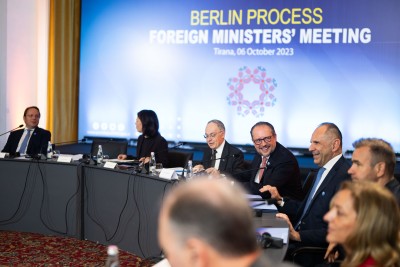Future of the Western Balkans in the EU: Rapprochement Despite Tensions
In recent years, the Western Balkans have increasingly become the focus of EU accession talks. The Berlin Process, a 2014 initiative of the German government, created a format that promotes regional cooperation in the Western Balkans and supports the countries' rapprochement with the EU.
 Austria's Foreign Minister Alexander Schallenberg participated in the meeting of foreign ministers in the framework of the "Berlin Process" in Tirana. / Picture: © BMEIA Bundesministerium für Europa, Integration und Äußeres / Gruber / Flickr Attribution 2.0 Generic (CC BY 2.0)
Austria's Foreign Minister Alexander Schallenberg participated in the meeting of foreign ministers in the framework of the "Berlin Process" in Tirana. / Picture: © BMEIA Bundesministerium für Europa, Integration und Äußeres / Gruber / Flickr Attribution 2.0 Generic (CC BY 2.0)
The annual meeting of foreign ministers within the framework of the Berlin Process took place this year in Tirana, the capital of Albania. Here, both Austrian Foreign Minister Alexander Schallenberg and German Foreign Minister Annalena Baerbock stressed that the future of the Western Balkans lies in the EU. Schallenberg pointed out that it was necessary to accelerate the integration process to achieve tangible improvements for the people in the region. He said it was equally important to limit the influence of external actors such as Russia and China in the region and to ensure equal accession requirements for all candidates.
A key theme of the conference, however, was the recent tensions in the region, particularly between Kosovo and Serbia. Recent attacks in northern Kosovo, troop movements on the border between the two countries, and Milorad Dodik's policy of secession in Bosnia and Herzegovina showed that the road to reconciliation and integration still holds many challenges. Baerbock stressed that these tensions are paralyzing the entire region and disrupting progress toward EU accession.
Nevertheless, there are also positive developments. The Berlin process has produced numerous agreements in recent years that promote economic and regional cooperation. These include the Regional Common Market, which is designed to allow the free movement of goods, services, capital, and people, as well as initiatives on freedom of travel and the recognition of higher education diplomas and professional qualifications. In addition, civil society is becoming more involved in the process, and there is an increased focus on issues such as climate protection and sustainability.
However, the agreements must be also implemented. Here, the commitment of the Western Balkan countries is often lacking. The European Union should push for commitments to be fulfilled and, if necessary, withhold support if implementation does not occur.
In conclusion, it is clear that the Western Balkans still face many challenges on the road to EU integration. However, the Berlin Process provides an important platform to address these challenges and foster cooperation in the region. With joint efforts, the dream of EU membership can become a reality for the Western Balkans.



